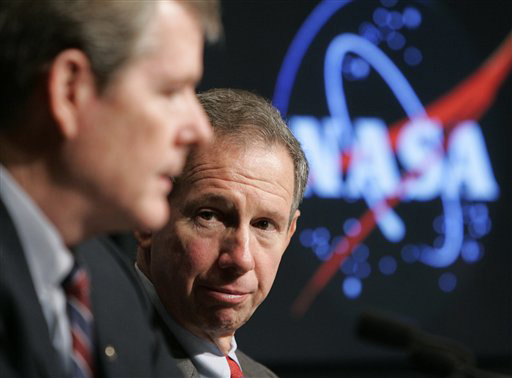House Panel Urges NASA for More Open Communication

Breaking space news, the latest updates on rocket launches, skywatching events and more!
You are now subscribed
Your newsletter sign-up was successful
Want to add more newsletters?
Discrepanciesbetween an independent review of NASA's astronaut healthcare system and anin-house survey prompted lawmakers Thursday to urge more open communicationsamong the U.S.space agency's ranks.
In July, anindependent panel evaluating NASA's astronaut medical and behavioral servicesrecommended a series of improvements for the agency's healthcare system. Thepanel also reported a pair of anecdotalaccounts of drunk astronauts that were laterallowed to fly despite safety concerns by fellow spaceflyersand flight surgeons.
But theresults of a NASA internal investigation, released lastweek, found no evidence that the alleged incidents ever took place, or thatsafety concerns from the agency's flight surgeon corps have ever been brushedaside.
"Thereal question is, is there that comfortableness within the NASA flight safetyoperations that allows everyone to step forward without feeling somehow they'reostracized," said Congressman Bart Gordon (D-Tennessee), chair of theHouse of Representatives Science and Technology Committee, during a Thursdayspace and aeronautics subcommittee hearing.
U.S. AirForce Col. Richard Bachmann, a veteran flight surgeon who led the independenthealth panel for NASA, said the split between the two reports may be due to acontinuing fear of professional repercussions among those working within thespace agency. To avoid such obstacles, his panel pledged anonymity to NASAastronauts, flight surgeons and other agency employees interviewed during theirhealthcare evaluation.
"Webelieve this may represent continued fear and barriers to communications and maybe cause for greater, not less, concern," Bachmann, commander of the Air Force School of Aerospace Medicine, told the subcommittee."The pictures that are painted by the two reports are diametrically inopposition. The fact that they are not coming forward with similar concernswhen NASA asks the questions, I believe, still represents a problem."
NASA'ssafety chief Bryan O'Connor, a former astronaut who conducted the agency'sinternal review, said that while he was unable to verify the independentpanel's accounts, there was the possibility that those interviewed werereluctant to come forward.
Breaking space news, the latest updates on rocket launches, skywatching events and more!
"There'salways a chance that someone may not feel totally comfortable speaking to theirsafety guy," O'Connor told the subcommittee.
The spaceagency is now preparing a focused anonymous survey for its employees to helpflush out any continuing concerns related to the independent panels' findings,O'Connor added.
NASAAdministrator Michael Griffin told the subcommittee that the independentpanel's accounts of alleged drunk astronauts, as well as the arrest of formerastronaut Lisa Nowak earlier this year which spurred the agency toreevaluate its healthcare system, have "shaken the public confidence"in the U.S. space agency.
"The personalconduct of NASA's workforce, including our astronauts, must be of the higheststandards, beyond reproach," said Griffin,adding that the agency demonstrates such excellence daily. "But in theface of the allegations and adversity which we've encountered recently we mustask and answer hard questions, and we've done that."
Ensuring anopen communication environment has been a prime target of NASA since 2003, wheninvestigators faulted theagency's internal culture as a contributor to the loss of the space shuttle Columbiaand its astronaut crew.
"Themore general allegation is a cultural problem that needs attention from the topsenior leadership," Rep. Tom Feeney (R-Florida) told Griffin during the hearing, referring to the alleged disregard of safety concerns in theindependent report.
"Fighting cultural problems is a little bit like shadowboxing, because I think that you're administration has undertaken to change theculture of that reporting," Feeney said.
Griffinrepeatedly urged space agency employees to come forward with any concerns theymay have during his testimony before the committee.
"Ifthere is anyone at NASA who has a concern, bring it forward. I need to hearit," Griffinsaid. "There's nothing more important to me in an agency like NASA thanhaving an open, free, non-political discourse on topics."
- NASAInvestigates Claims That Astronauts Flew After Drinking
- SPACE.com Video Interplayer: NASA's STS-118 Shuttle Mission
- All About Astronauts

Tariq is the award-winning Editor-in-Chief of Space.com and joined the team in 2001. He covers human spaceflight, as well as skywatching and entertainment. He became Space.com's Editor-in-Chief in 2019. Before joining Space.com, Tariq was a staff reporter for The Los Angeles Times covering education and city beats in La Habra, Fullerton and Huntington Beach. He's a recipient of the 2022 Harry Kolcum Award for excellence in space reporting and the 2025 Space Pioneer Award from the National Space Society. He is an Eagle Scout and Space Camp alum with journalism degrees from the USC and NYU. You can find Tariq at Space.com and as the co-host to the This Week In Space podcast on the TWiT network. To see his latest project, you can follow Tariq on Twitter @tariqjmalik.
